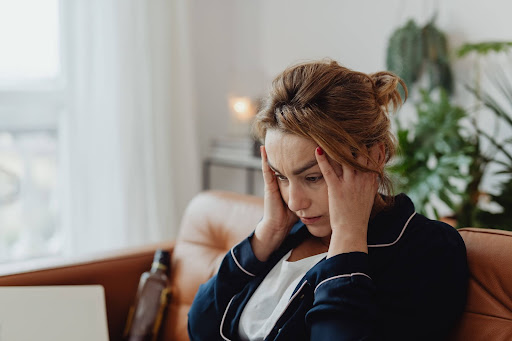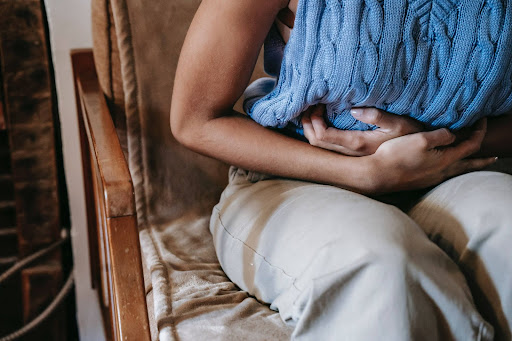October 17, 2022
Symptoms and Signs of Endometriosis: Is It All In My Head?
Endometriosis is a serious and very real medical condition that can cause extreme pain, infertility and fatigue amongst other symptoms. Unfortunately, many people do not know what to look for when it comes to the symptoms and signs of endometriosis.
 As a result, too many people are still being misdiagnosed or left to suffer in silence. Our aim as a charity is to ensure this doesn’t happen. Only by educating and starting conversations will we get to a point where people feel heard.
As a result, too many people are still being misdiagnosed or left to suffer in silence. Our aim as a charity is to ensure this doesn’t happen. Only by educating and starting conversations will we get to a point where people feel heard.
The more we understand about this illness and the more we delve into our own experiences, the better we can be at identifying it. Right now, many healthcare professionals see it as a needle in a very large haystack. But in reality – it’s not rocket science to diagnose.
Let’s take a look at why that is.
Symptoms and Signs of Endometriosis
We’re all individuals and so our bodies will react differently, no matter what we have going on inside or out. However, there are some general experiences that people will go through.
Pelvic Pain
This is one of the most common things people with endo will complain about. This doesn’t just mean the occasional twinge or discomfort during your period. Pelvic pain associated with this condition can be severe and debilitating, often causing someone to miss work or social engagements. It can be sharp or aching and is usually felt in the lower abdomen, around the time of your period.
However, it is important to remember that not everyone will experience pelvic pain. In fact, some people may only ever experience mild discomfort which can easily be dismissed as ‘period pain’. This is one of the reasons why so many women go undiagnosed for years.
Not only that but people who do suffer can often be told it is normal to experience that level of pain with periods. It certainly isn’t! So if you do experience this, please seek medical advice.
Heavy Periods or Menorrhagia
Another one of the common symptoms and signs of endometriosis is heavy bleeding during your period or what’s known as menorrhagia. This can be anything from needing to change your pad or tampon every hour, passing large clots or flooding (soaking through to your clothes or bedding).
This can be extremely distressing and make everyday life very difficult. Again, this is something that is often seen as normal by both sufferers and healthcare professionals. While some people will inevitably have heavier flows than others – it is crucial we understand the boundary between heavy and excessive. You know your own body – so if something doesn’t feel right, seek help!
Infertility
It is estimated that around 30-50% of people with the condition will have difficulties conceiving. However, it’s not thought that this is necessarily caused by the condition itself. Due to lack of research, the links between the two are not fully reputable or understood.
However, endo warriors who do have trouble getting pregnant often find success in medical intervention such as IVF or through removing the endometriosis. If you’re trying to conceive and have been for some time with no success, it might be worth discussing your struggles with a fertility specialist.
Fatigue
Endo can cause fatigue in two ways. Firstly, the pain itself can become so debilitating that everyday tasks become a struggle. Your body is trying to fight so much that you just can’t do a lot else. It can leave people hunched over and bedridden for extended periods.
Secondly, from anaemia. This is caused by heavy blood loss during periods and can lead to feelings of lethargy, dizziness and shortness of breath. If you’re struggling with fatigue, it might be worth checking your iron levels with a GP.
It is one thing to feel tired, but not being able to carry out your usual routine is most definitely not right. You have to gauge what is normal to you, and what may have changed recently. Symptoms and signs of endometriosis will vary from person to person so listening to your body is key.
Painful Intercourse
Dyspareunia, or pain during sex, is another common sign of the condition. This can be anything from a mild discomfort to severe pain, often described as a deep burning or stabbing sensation.
This is caused by the endometriosis lesions growing on or near sexual organs and can make intercourse unbearable for many. It is important to understand that this isn’t in your head and seeking help from a medical professional is vital if you’re struggling.
Too many people just expect pain and think everyone goes through it at some level. The truth is, there shouldn’t be any pain. It should be comfortable for all parties involved and should not be something you dread.
Cyclical Symptoms
 Symptoms and signs of endometriosis are often cyclical, meaning they tend to follow the pattern of your menstrual cycle. This can make them very easy to dismiss as ‘just period pain’ or ‘part of being a woman’.
Symptoms and signs of endometriosis are often cyclical, meaning they tend to follow the pattern of your menstrual cycle. This can make them very easy to dismiss as ‘just period pain’ or ‘part of being a woman’.
However, if you’re experiencing any kind of discomfort that follows this pattern, it is worth investigating further. Many women find their pain and fatigue at their worst in the lead up to their period starting (known as the luteal phase). If this is you, take note and discuss with your GP.
There are so many different symptoms and signs of endometriosis, it can be hard to keep track. Pay attention to your body and if something doesn’t feel right, get it checked out! The earlier you catch the condition, the easier it can be to treat.
Nothing should be ignored or swept under the rug – we need to start talking about them openly to break the taboo. With knowledge comes power, and with power comes change. Let’s take control of our bodies and demand better for ourselves!
If you’re experiencing any of these symptoms, please don’t hesitate to contact your GP for help. Endometriosis is a serious condition that should not be ignored! Symptoms may vary from person to person, so it is important to listen to your body and get help if something doesn’t feel right.
Before Menarche
Although it is pretty rare, in some cases, symptoms and signs of endometriosis can start before someone even gets their first period. This is called premenarchal onset endometriosis and can be extremely painful and debilitating.
Symptoms can include pelvic pain, fatigue, constipation and painful urination. If your child or someone you know is experiencing any of these things, it’s important to get it checked out. As we’ve already mentioned, early diagnosis and treatment is key to managing the condition effectively.
Especially if you notice any sudden changes or symptoms that occur in patterns, it is important to make sure you’re not looking at something serious.
This condition doesn’t just disappear – it will continue to grow and spread without treatment. Symptoms and signs of endometriosis can vary greatly from person to person, so it is important to listen to your body and get help if something doesn’t feel right. Don’t suffer in silence – we need to break the taboo around this condition and start talking about it openly!
Misdiagnosis
One of the biggest problems with endometriosis is that it often takes years to get a diagnosis. Many people are misdiagnosed with other conditions, such as IBS, pelvic inflammatory disease or even just told they’re overreacting to normal period pain.
This is a huge issue as endometriosis can cause a lot of damage if left untreated. It can lead to infertility, chronic pain and even organ damage. The longer it goes on, the worse it can become, so it is vital to get an accurate diagnosis as soon as possible.
Because so many of the symptoms reflect other conditions , it can be hard to get a definite answer. If you suspect you may have endometriosis, the best thing to do is to keep a Symptoms Diary. This will help you track your symptoms and discuss them with your GP in more detail.
It will also allow you to figure out if there are any patterns and times where you are suffering more or less. Keep a close eye out around your period as this is what you’re likely to be asked about. But don’t forget to note down the severity of your pain and any changes you notice week on week.
The Myth That It’s All In Your Head
It can be a long and frustrating journey to get a diagnosis, but it is so important to persevere.
Unfortunately, there is still a lot of stigma surrounding endometriosis. Many people believe that the pain is all in your head or that you’re just overreacting to normal period pain.
This couldn’t be further from the truth! Endometriosis is a serious condition that should not be ignored. Symptoms may vary from person to person, but the pain is very real.
We would love to help with more advice, information or support so feel free to check out more of our blogs, social media content or get in touch! We have plenty of first person accounts on our website too, so don’t forget – you’re not alone!

